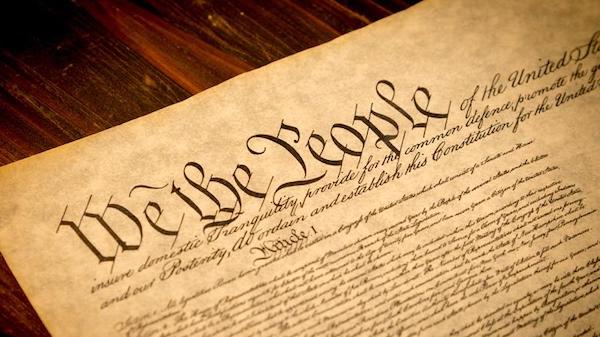Some radical leftists confronted me with their opinion that America’s founding fathers and the constitution they wrote had racist intentions. And to prove their point they cited Article 1, Section 2, Paragraph 3 of the United States Constitution–the 3/5th compromise.3/5th compromise
“ Representatives and direct Taxes shall be apportioned among the several States which may be included within this Union, according to their respective Numbers, which shall be determined by adding to the whole Number of free Persons, including those bound to Service for a Term of Years, and excluding Indians not taxed, three- fifths of all other persons.”
Those “other persons” were a reference to the black slaves. To those leftists, the 3/5th figure was an indication our founding fathers were a bunch of racists who thought that the African slaves were worth only 60% of a human being. That is both simplistic and very wrong. The three-fifths compromise was designed to stunt the power of the slave states, with the purpose of eventually ending the disgusting practice of slavery.
The founders who lived in the northern states strongly opposed slavery. They insisted on counting the slaves as less than “full persons” to prevent the slave states from getting too many congressmen and too many electoral votes allowing to dominate the government and prevent slavery from ever being abolished.
The slave states wanted their slaves to be counted as a full person so they could dominate the House of Representatives and the Presidency. This would allow southern whites to have the benefit of counting the slaves—controlling the political power of the slaves who were not allowed to vote.
The Northern States did not want them counted at all. The “three-fifths of all other persons” is meant to refer to the slave population as a whole, not to the humanity of each individual.
Those of you who took high school history may remember the “3/5th Compromise.” It was initially proposed by Roger Sherman of Connecticut, and James Wilson of Pennsylvania. Sherman BTW was the only person to have signed all four great state papers of the United States: the Continental Association of 1774, the Declaration of Independence, the Articles of Confederation, and the Constitution.
Just like one of today’s Connecticut public servants, Sherman never served in Vietnam, although unlike Sen. Blumenthal he never claimed he did. Wilson was one of the first justices of the Supreme Court. Confirmation by the Senate in those days was much easier as there were no Democrats to make false claims that he raped a girl in college.
The Federalist papers demonstrate the mindset of the founding fathers was against the continuation of slavery, but they believed that it could never be stopped abruptly. Therefore they would need to wean the horrible practice away from their Southern brethren.
In Federalist #38 Madison justified the constitutional provision allowing slave trading for 20 years because it was an improvement:
Is the importation of slaves permitted by the new Constitution for twenty years? By the old, it is permitted forever.
In Federalist #42 Madison wrote:
It were doubtless to be wished, that the power of prohibiting the importation of slaves had not been postponed until the year 1808, or rather that it had been suffered to have immediate operation. But it is not difficult to account, either for this restriction on the general government, or for the manner in which the whole clause is expressed. It ought to be considered as a great point gained in favor of humanity, that a period of twenty years may terminate forever, within these States, a traffic which has so long and so loudly upbraided the barbarism of modern policy; that within that period, it will receive a considerable discouragement from the federal government, and may be totally abolished, by a concurrence of the few States which continue the unnatural traffic, in the prohibitory example which has been given by so great a majority of the Union. Happy would it be for the unfortunate Africans, if an equal prospect lay before them of being redeemed from the oppressions of their European brethren!
Attempts have been made to pervert this clause into an objection against the Constitution, by representing it on one side as a criminal toleration of an illicit practice, and on another as calculated to prevent voluntary and beneficial emigrations from Europe to America. I mention these misconstructions, not with a view to give them an answer, for they deserve none, but as specimens of the manner and spirit in which some have thought fit to conduct their opposition to the proposed government.
Ben Franklin freed his slaves and was a key founder of the Pennsylvania Anti-Slavery Society, In 1790 Franklin presented a petition to Congress urging it to grant liberty “to those unhappy men who alone in this land of freedom are degraded into perpetual bondage.” Congress ignored him.
Alexander Hamilton was opposed to slavery and along with John Jay and other anti-slavery advocates, helped to found the first African Free School in New York City. Jay helped to establish the New York Manumission (literally voluntary freeing of slaves) Society and when he was governor of New York in 1798, signed into law the state statute ending slavery in NY as of 1821.
When Constitution signer William Livingston heard of the New York society he, as Governor of New Jersey, wrote them, offering:
“I would most ardently wish to become a member of it [the society in New York] and… I can safely promise them that neither my tongue, nor my pen, nor purse shall be wanting to promote the abolition of what to me appears so inconsistent with humanity and Christianity… May the great and the equal Father of the human race, who has expressly declared His abhorrence of oppression, and that He is no respecter of persons, succeed a design so laudably calculated to undo the heavy burdens, to let the oppressed go free, and to break every yoke.”
Washington was a paradox, he was a slave owner who hated slavery
“I can only say that there is not a man living who wishes more sincerely than I do to see a plan adopted for the abolition of it [slavery].”-George Washington
Jefferson was also a paradox. He owned slaves, but throughout his entire life, Thomas Jefferson was publicly a consistent opponent of slavery. Calling it a “moral depravity” and a “hideous blot,” he believed that slavery presented the greatest threat to the survival of the new American nation. Jefferson also thought that slavery was contrary to the laws of nature, which decreed that everyone had a right to personal liberty. These views were radical in a world where unfree labor was the norm.
Washington’s successor John Adams did not own slaves and hated the practice:
“[M]y opinion against it [slavery] has always been known… [N]ever in my life did I own a slave.”-John Adams
Slavery will always be a horrible chapter in American History, but the three-fifths compromise was not. It was not a measurement of human worth; it was an attempt to reduce the number of pro-slavery proponents in Congress. By including only three-fifths of the total numbers of slaves into the congressional calculations, Southern states were actually being denied additional pro-slavery representatives in Congress and electoral votes for selecting the president.
Now if we could only count these extreme leftists as three-fifths of a person for census purposes.
3/5th compromise
3/5th compromise
https://lidblog1.wpenginepowered.com






